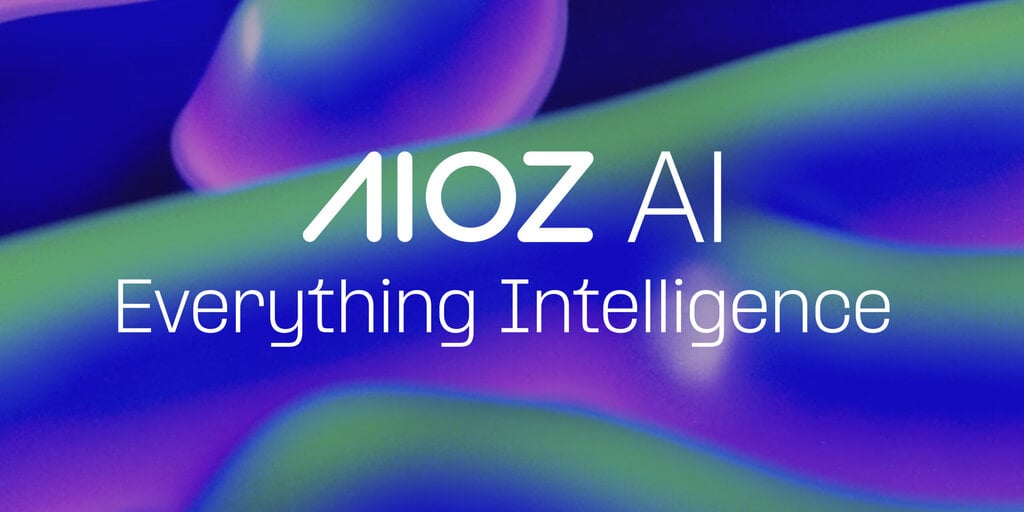DePIN-powered ecosystem AIOZ AI is building a full-stack infrastructure that decentralizes artificial intelligence.
AIOZ AI aims to “empower contributors” by offering them more control over their work, enabling developers, researchers and technical teams to publish, share and scale their datasets in a collaborative setting.
Where conventional AI models are created in opaque environments with a lack of transparency over their methodology, AIOZ AI’s distributed approach is geared towards offering AI compute with “better efficiency, security, and accessibility,” AIOZ Network Founder and CEO Erman Tjiputra told Decrypt.
Through AIOZ AI, users can upload and store datasets and train their models—with the potential for token rewards based on how they perform and are used by others.
This is supported by AIOZ Network’s Decentralized Physical Infrastructure Network (DePIN), with over 300,000 devices contributing their spare computing power toward AI compute, decentralized storage and content delivery.
The goal is to give contributors more control over their AI assets, such as models and datasets, while making it easier for innovators to deploy AI solutions that benefit everyday people.
Several models are already available on AIOZ AI, including image-to-image processing models like background removal, background replacement, image to anime, and video to canny edge.
Beyond this, “lightweight and efficient” Image Super-Resolution (SR) models on AIOZ AI can reconstruct high-fidelity images from low-resolution inputs, which is “exceptionally beneficial” for digital content creators and archival restoration projects, according to AIOZ Network. Potential future applications of AIOZ AI models include real-time video upscaling for streaming platforms and adaptively optimizing image quality based on available bandwidth, as well as tools that can perform object-aware image sharpening and detail recovery.
“With AIOZ AI, we’re building a people‑powered AI economy,” Tjiputra said. “Developers keep control of their models and datasets, run them on community compute, and unlock the potential for token rewards when their work powers real applications.”
AIOZ AI Challenge
One of the AIOZ AI platform’s core features is its AIOZ AI Challenge system, which enables any organization, researcher or developer to host competitions within the ecosystem. These challenges turn real-world problems into open, collaborative AI projects that run on the network’s decentralized compute layer.
Challenges already active on the platform include building a regression model that accurately predicts what a house’s final sale price would be based on key data points, including location, square footage, and the number of bedrooms. Another involves developing a natural language processing model that can deduce when movie reviews are either negative or positive.
Have you joined the Movie Reviews Sentiment Analysis Challenge?
It’s a hands-on NLP adventure that leads you through the process of decoding sentiments from movie reviews.
This practical skill powers real-world magic, such as Box Office Predictions, Movie Recommendations, &… pic.twitter.com/6Hj706NjZh
— AIOZ Network (@AIOZNetwork) November 10, 2025
A previous challenge organized by AIOZ Network rewarded users for their efforts in solving a pressing real-world problem: the Face Anti-Spoofing Challenge encouraged competitors to create a model that can accurately distinguish between genuine faces and impostors, such as those trying to gain access to accounts through printed photos, 3D masks or deepfake videos. With recognition tools now widely used across financial apps, AIOZ Network described solutions to this challenge as “critical.”
In some cases, top participants in AIOZ AI Challenges gain recognition across the community, with standout solutions being eligible for digital swags and potential token rewards. Each Challenge includes a Discussion section, where budding developers can ask technical questions and exchange ideas.
According to AIOZ Network, initiatives like this are part of a concerted push to build “Everything Intelligence”—with builders banding together to push the boundaries of AI as one.
Daily Debrief Newsletter
Start every day with the top news stories right now, plus original features, a podcast, videos and more.
